
When diving into digital advertising, the terms PPC vs CPC often come up. But what’s the difference? PPC, or Pay-Per-Click, is a model where advertisers pay each time their ad is clicked. CPC, or Cost-Per-Click, refers to the amount paid for each click. This article will guide you through the essential differences and how each impacts your ad spend strategy.
Key Insights
- PPC advertising allows advertisers to pay only when users click on their ads, ensuring that costs align with user engagement and targeted traffic generation.
- Cost-Per-Click (CPC) is a crucial metric within PPC campaigns, representing the average cost incurred for each click and influencing budget optimization and campaign effectiveness.
- While PPC offers immediate visibility and targeted reach, it requires ongoing management to address competition, control costs, and maximize return on investment.

Understanding Pay-Per-Click (PPC) Advertising
Pay-Per-Click (PPC) advertising is a type of digital advertising called ppc. In this model, advertisers incur a charge each time their ad is clicked. This approach is a powerful tool in online advertising, enabling businesses to incur costs only when their ads drive targeted traffic to their websites. PPC campaigns can be run on various platforms such as Google Ads, Microsoft Advertising, and social media platforms like Facebook, Twitter, Instagram, and LinkedIn, making it a versatile strategy for reaching diverse audiences. Pay per click advertising is an effective way to maximize return on investment.
Grasping the mechanics of PPC is crucial for any marketer aiming to utilize this advertising model effectively. In a PPC campaign, advertisers bid on keywords related to their products or services. The amount of the bid, along with the quality and relevance of the ad, determines its placement on search engines or other platforms. This competitive bidding process ensures that the most relevant ads reach users who are actively searching for related products or services.
PPC advertising relies heavily on platform policies like those of Google Ads and PPC ad. Changes to these policies can greatly affect campaign performance, highlighting the need to stay informed about platform guidelines and best practices.
Armed with these basics, we can explore the mechanics of PPC ads and their benefits.
How PPC Ads Work
At its core, PPC advertising is straightforward: advertisers pay each time someone clicks their ad. This approach guarantees costs only when the ad engages a potential customer. One of the primary aspects of PPC is CPC bidding, where advertisers pay for each click on their ads. This makes payment per click a fundamental aspect of PPC, aligning costs directly with user engagement.
Advertisers bid on specific keywords that are relevant to their business, influencing the ad placement on search engine results pages (SERPs) or other platforms like Bing Ads. The main parameters set in a PPC campaign include the price per click, ad placement, and specific keywords. This bidding process is competitive, with advertisers declaring the maximum amount they’re willing to pay for each click on their advertisement.
On platforms like Google, PPC ads typically appear on the SERP, offering brands immediate visibility. The primary goal of PPC advertising is to showcase brands and their offerings to users precisely when they’re searching for related products or services.
Factors such as the amount bid, ad quality, and relevance play crucial roles in determining an ad’s position and visibility. Effective management of these elements allows advertisers to enhance the impact of their PPC campaigns.
Benefits of PPC Campaigns
One of the most significant advantages of PPC advertising is its ability to provide immediate visibility for businesses, connecting them with potential customers quickly. This immediate exposure is invaluable, especially for new businesses or those looking to promote time-sensitive offers. Additionally, PPC campaigns allow for precise targeting of specific demographics and behaviors, ensuring that ads reach the most relevant audience.
Another benefit of PPC campaigns is their potential to achieve higher click-through rates and conversions. Driving significant traffic and visibility, PPC proves to be an effective tool for boosting sales and generating leads. The ability to measure and analyze campaign performance in real-time further enhances the effectiveness of PPC advertising, allowing for continuous optimization and improvement.

What is Cost-Per-Click (CPC)?
Cost-Per-Click (CPC) is an essential metric in PPC advertising that indicates the amount an advertiser pays for each click on their ad. This metric is essential for assessing the effectiveness and efficiency of ad spend in PPC campaigns. Understanding CPC enables advertisers to assess spending vs. clicks, optimizing budgets and maximizing ROI.
Managing CPC effectively is key to optimizing click-through rates (CTR) and overall campaign profitability. Brands aim to achieve a low CPC to ensure a profitable return on their advertising investment. Continuous monitoring and adjustment of CPC allow advertisers to make informed decisions, enhancing PPC campaign performance.
In essence, CPC serves as a vital indicator of how well an advertising campaign is performing financially. Monitoring this metric ensures efficient and effective ad spend, driving better results and higher profitability.
How CPC is Calculated
Calculating CPC is a straightforward process, using the formula: CPC = Total cost of PPC campaign / Number of clicks. This formula allows advertisers to calculate the average cost per click on their ads. Several factors influence CPC, including keyword demand, ad quality, and competition from other brands. These factors can cause fluctuations in CPC, necessitating continuous strategy adjustments.
Bidding strategies also play a significant role in determining CPC. Enhanced Cost-Per-Click (ECPC) and manual Cost-Per-Click are two common strategies that can impact CPC based on the overall budget and competing ads. Selecting the right bidding strategy helps optimize ad spend and achieve improved results.
Average vs. Maximum CPC
Average CPC and maximum CPC are two important concepts in PPC advertising. The maximum CPC is the highest bid a brand is willing to pay for ad placement and keywords. On the other hand, the average CPC is what advertisers typically pay, which is often lower than the maximum bid due to factors like competition and quality scores.
For example, the average cost for a Google ad is $0.49, whereas a Facebook ad averages $1, and a YouTube ad costs about $0.20. Marketers aim to reduce the price of clicks while ensuring high-quality clicks.
Understanding the difference between average and maximum CPC helps advertisers manage budgets and optimize campaigns more efficiently.
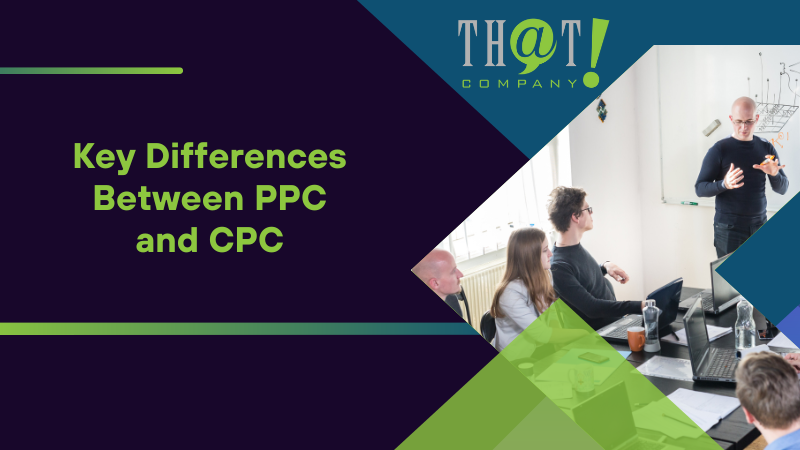
Key Differences Between PPC and CPC
While PPC and CPC are closely related, they serve different functions in digital marketing. PPC stands for Pay-Per-Click, which is the advertising model where advertisers incur a charge for each click on their ads. CPC, or Cost-Per-Click, is a metric that measures the cost associated with those clicks. Grasping the difference between these concepts is key to developing effective advertising strategies and managing budgets.
PPC operates on a broader level, encompassing the overall strategy of managing ad campaigns. CPC, on the other hand, is primarily focused on the cost per individual click. Recognizing these differences allows advertisers to navigate digital marketing complexities and optimize their campaigns for success.
In summary, PPC involves paying per ad click, while CPC gauges the financial efficiency of those clicks. Recognizing these distinctions allows advertisers to make more informed decisions and achieve better results from their advertising efforts.
Payment Models
In PPC advertising, advertisers incur costs each time a user clicks on their advertisement. This model ensures payment is based on user engagement, charging only when your ad engages a potential customer. In the CPC model, advertisers also pay only when someone clicks on their ad, making it a valuable metric for assessing the cost-effectiveness of campaigns.
Understanding different bidding strategies, such as Enhanced CPC and Target CPA, can help optimize ad budget usage. These strategies automate bids based on the likelihood of conversion, ensuring that advertisers get the best value for their spending.
Utilizing these models helps advertisers maximize ROI and improve campaign performance.
Focus and Metrics
CPC is centered on the financial efficiency of each click, whereas PPC encompasses the broader strategy of managing ad campaigns. In PPC, advertisers can control ad spend restrictions, bid adjustments, and access real-time metrics to evaluate campaign performance.
Factors such as keyword competition, user behavior, and other variables make it impossible to predict click costs in PPC. The cost of keywords in PPC is influenced by the bidding process and the desirability of the keywords, which requires continuous optimization and monitoring.
Concentrating on these metrics ensures campaigns remain efficient and effective.
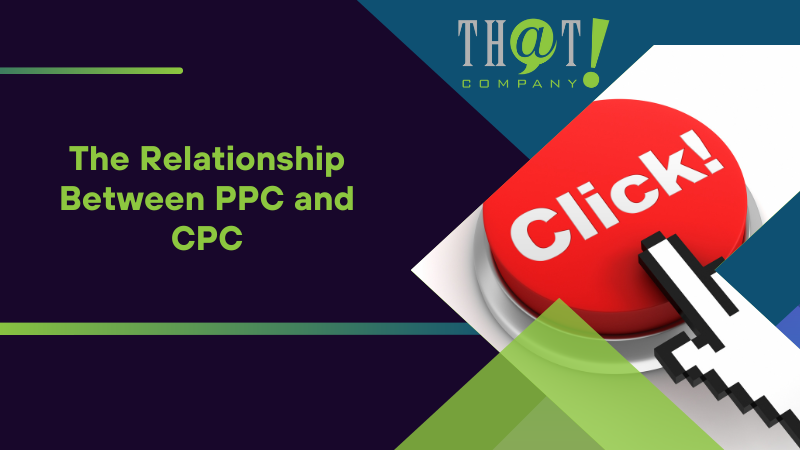
The Relationship Between PPC and CPC
PPC and CPC are intrinsically linked in the world of digital advertising. PPC is the system where advertisers pay per ad click, while CPC is the metric that measures the cost of those clicks. This relationship is crucial for evaluating the performance and efficiency of PPC campaigns. Understanding the interaction of these concepts allows advertisers to optimize ad spend and achieve better results.
CPC serves as a key metric for determining the budget efficiency of PPC campaigns. Setting maximum bids allows PPC marketers to control spending per click, ensuring effective use of ad spend. This interplay between PPC and CPC highlights the importance of strategic planning and continuous optimization.
Impact of CPC on PPC Performance
CPC significantly impacts the success and cost-effectiveness of PPC campaigns. The optimal CPC for a brand is influenced by its ad ranking and the competition from similar brands. Regular analysis of campaign metrics enables businesses to assess ad performance and make informed future decisions.
Utilizing analytics tools like Google Analytics can provide insights into which ads perform best and why. These insights enable ongoing optimization and help businesses achieve better results from their PPC campaigns. Focusing on CPC ensures efficient and effective use of ad spend.
Strategies to Optimize CPC in PPC Campaigns
Optimizing CPC within PPC campaigns involves several strategies. Utilizing negative keywords helps refine targeting and minimize wasted ad spend by preventing ads from showing for irrelevant searches. Regularly updating your keyword list is crucial for maintaining campaign effectiveness.
Automated bidding strategies can also help optimize ad placements and manage budgets more efficiently. That! Company utilizes advanced automation and AI-driven bid strategies to optimize ad spend, ensuring the highest possible return on investment while minimizing wasted clicks.
Implementing these strategies helps advertisers achieve better results from their PPC campaigns.
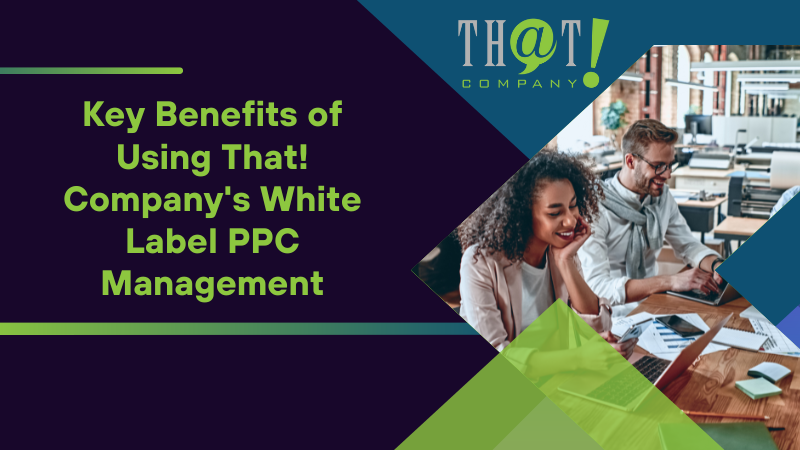
Key Benefits of Using That! Company’s White Label PPC Management
That! Company’s white label PPC management services offer several advantages for agencies looking to optimize their PPC campaigns. By outsourcing PPC management to specialists, agencies can ensure expert handling without the overhead of hiring in-house staff. This model helps agencies save time and resources, allowing them to focus on other aspects of their business.
Outsourcing PPC management can lead to significant cost reductions. White label PPC services provide scalability, enabling agencies to handle fluctuating client demands without compromising service quality.
By partnering with a white label PPC management firm like That! Company, agencies can present themselves as full-service providers while maintaining their brand identity. This approach enhances an agency’s reputation and ensures clients receive high-quality results from experienced professionals.

Setting Up Your First PPC Campaign
Setting up your first PPC campaign can seem daunting, but with the right approach, it can be a straightforward and rewarding process. That! Company provides quick and efficient client onboarding, including complete PPC campaign setups and takeovers. Essential components of successful PPC campaigns include planning, goal setting, targeting, ad creation, and continuous monitoring and optimization.
Start by establishing clear campaign goals, whether to increase sales, generate leads, or promote brand awareness. Well-defined objectives guide strategy and measure success.
Next, target the right keywords and create compelling ads to reach the most relevant audience.
Ongoing monitoring and optimization are crucial for maintaining the effectiveness of your campaign. Regular analysis of performance metrics and necessary adjustments enhance campaign efficiency and achieve better results.
With these steps in mind, let’s delve into the specific components of setting up a successful PPC campaign.
Keyword Research and Selection
Keyword research is the foundation of any successful PPC campaign. Tools like SEMrush and Google Keyword Planner are invaluable for identifying high-traffic and relevant keywords for your campaign. A keyword strategy involves finding the right keywords, adding them to your campaigns, and continuously optimizing them for improved performance.
Long-tail keywords can boost click-through rates due to their specific relevance in search queries. By focusing on these more specific keywords and keyword targeting, you can attract a more targeted audience that is likely to convert.
Thorough keyword research and selection lay the foundation for a successful PPC campaign.
Crafting Compelling Ad Copy
Crafting compelling ad copy is critical for driving clicks and conversions in PPC campaigns. Using unique selling propositions in your ad copy can enhance engagement and attract more clicks. Effective ad copy should highlight the value proposition and include a clear call to action to encourage user engagement.
Responsive Search Ads allow marketers to create multiple headlines and descriptions that Google dynamically tests for optimal performance. Continuous testing and optimization of ad copy enhance campaign effectiveness and yield better results.
Optimizing Landing Pages
Optimizing landing pages is essential for increasing conversion rates and ensuring a successful PPC campaign. Landing pages should have a fast loading speed to ensure a positive user experience and enhance conversion rates. Additionally, the content of the landing page should align with the ad content to improve relevance and user satisfaction.
Improving ad relevance and landing page quality can significantly lower CPC, leading to a more cost-efficient campaign. A/B testing different landing page elements can also help identify the most effective design and content, further boosting conversion rates.
Continuous landing page optimization boosts overall PPC campaign performance.
Setting Bidding Requirements
Setting bidding requirements is a crucial step in managing a successful PPC campaign. Google Ads is an example of a platform where you can set your bidding requirements. This process can be tricky for newcomers due to the lack of experience with performance and cost prediction. However, with practice and continuous learning, you can master the art of setting effective bids.
PPC allows advertisers to set flexible budgets that adjust according to the number of clicks received. Setting appropriate bidding requirements helps control ad spend and ensure efficient budget use. Continuous monitoring and adjustment of your bids will help you achieve better results and optimize your campaign performance.
Analyzing Campaign Results
Analyzing campaign results is essential for understanding the effectiveness of your PPC campaigns and making data-driven decisions. MarketMuse can be used to assess landing page performance against competitors, providing valuable insights into areas for improvement. By constantly evaluating and tweaking your campaigns, you can enhance their effectiveness and achieve better results.
The flexibility of PPC enables rapid campaign launches and adjustments based on performance insights. Regular analysis of campaign metrics identifies successful strategies and areas for improvement, ensuring continuous optimization and better performance.
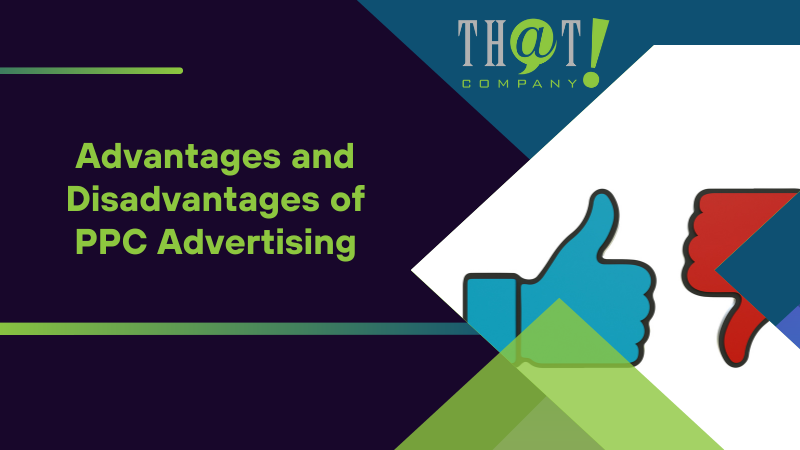
Advantages and Disadvantages of PPC Advertising
PPC advertising offers several advantages, including immediate visibility and the ability to target specific demographics and behaviors. This makes it an effective tool for increasing sales, generating leads, and promoting brand awareness. Establishing clear goals and a strategic approach to bidding can help you maximize the benefits of ppc marketing.
However, PPC has disadvantages such as high competition, price increases, and the need for constant management. Additionally, not all clicks lead to sales, which can affect the overall cost-effectiveness of your campaigns. Understanding these pros and cons can help you make informed decisions about whether PPC is the right strategy for your business.
Immediate Exposure vs. High Costs
PPC advertising provides immediate exposure, which is invaluable for businesses looking to quickly reach potential customers. This is especially beneficial for new businesses or those with time-sensitive offers. However, the high costs associated with PPC can be a significant drawback, particularly in competitive industries. Sustained investment is required to maintain visibility and achieve desired results.
Repeated exposure to PPC ads can also lead to ad blindness, where users begin to ignore the ads, diminishing their effectiveness. Balancing the benefits of immediate visibility with the potential downsides of high costs and ad blindness is crucial for a successful PPC strategy.
Control Over Budget vs. Constant Management
One of the key advantages of PPC advertising is the ability to set specific budgets for your campaigns, allowing for controlled spending. This flexibility enables advertisers to manage their ad spend effectively and ensure that their budget is used efficiently. However, this also means that advertisers must continuously manage their campaigns to prevent budget waste and optimize performance.
Click fraud is another risk in PPC campaigns, where malicious clicks can drain advertising budgets without genuine interest. Constant vigilance and proactive management are essential to mitigate these risks and ensure the success of your PPC campaigns. By balancing budget control with continuous management, you can maximize the benefits of PPC advertising.
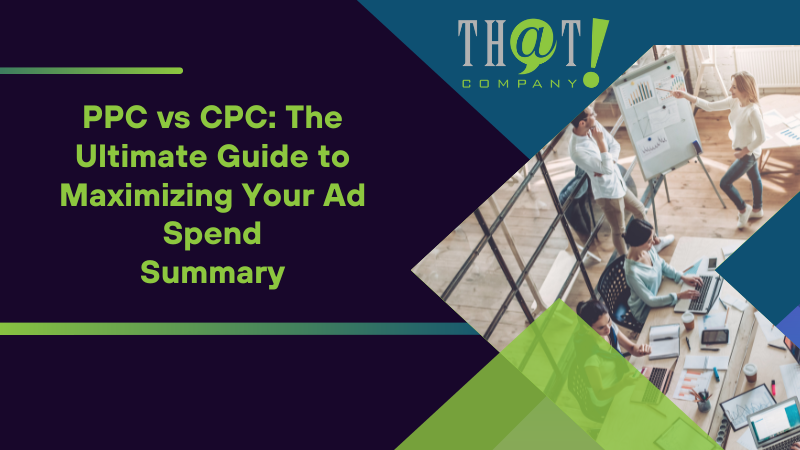
Summary
In summary, understanding the differences between PPC and CPC is crucial for maximizing your ad spend and achieving your marketing goals. PPC advertising offers immediate visibility and the ability to target specific demographics, while CPC serves as a key metric for evaluating the cost-effectiveness of your campaigns. By leveraging both concepts, you can optimize your advertising strategy and achieve better results.
From setting up your first PPC campaign to utilizing That! Company’s digital agency white label PPC management services, this guide has provided you with the knowledge and tools needed to succeed in digital advertising. By continuously optimizing your campaigns and staying informed about the latest trends and best practices, you can achieve sustained success and drive significant growth for your business.

Frequently Asked Questions
What is the difference between PPC and CPC?
The key difference is that PPC refers to the advertising model itself, where payment is made per click, while CPC is the metric that quantifies the cost incurred for each click on the ad. Understanding this distinction is essential for effective online advertising management.
How is CPC calculated?
CPC is calculated by dividing the total cost of the PPC campaign by the number of clicks received. Key factors influencing CPC are keyword demand, ad quality, and competition.
What are the benefits of using That! Company’s white label PPC management?
Utilizing That! Company’s white label PPC management provides expert handling and scalability, leading to cost reductions and an enhanced agency reputation. This ensures clients receive high-quality results.
How can I optimize my PPC campaigns?
To optimize your PPC campaigns, prioritize thorough keyword research, create compelling ad copy, enhance your landing pages, implement effective bidding strategies, and regularly analyze your campaign performance for improvements.
What are the advantages and disadvantages of PPC advertising?
PPC advertising offers immediate visibility and targeted reach, making it an effective strategy for driving traffic. However, PPC white label services can help manage high costs, ongoing optimization, and risks like click fraud.


















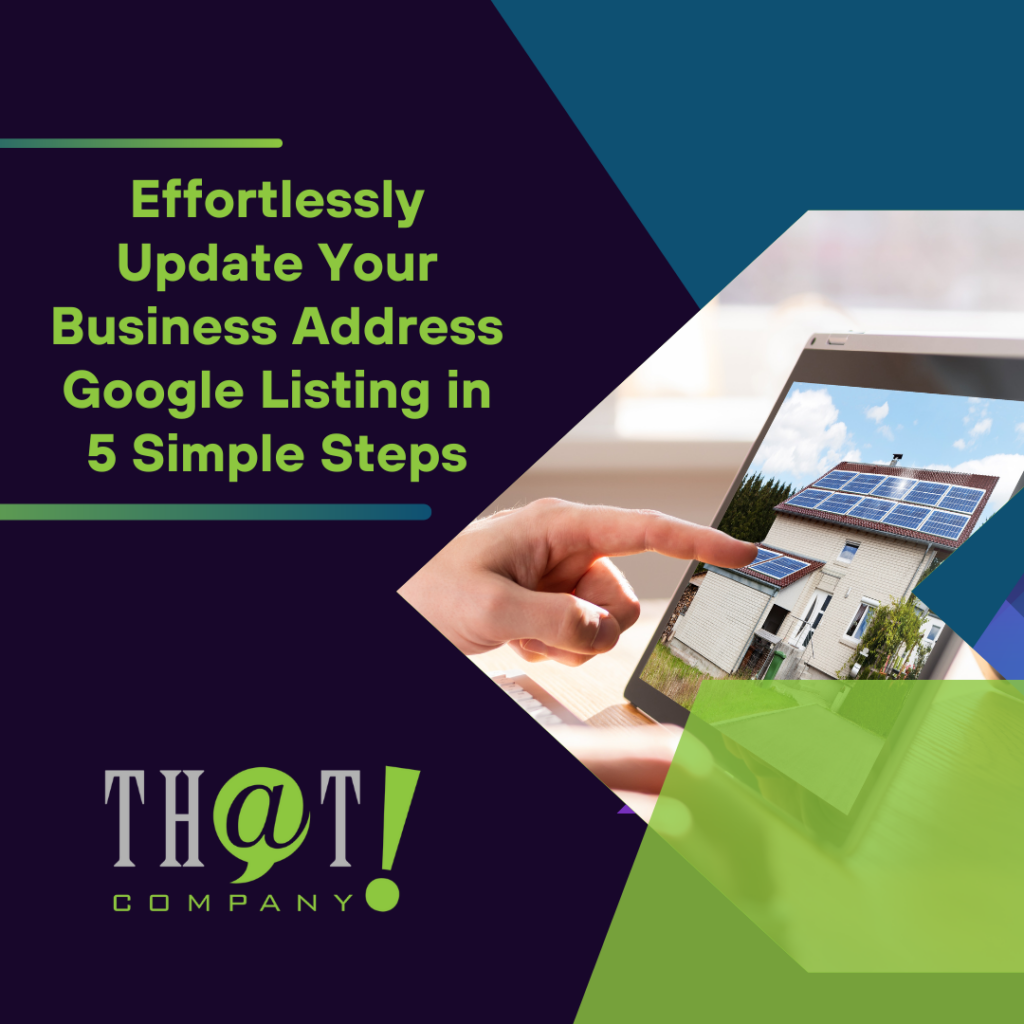

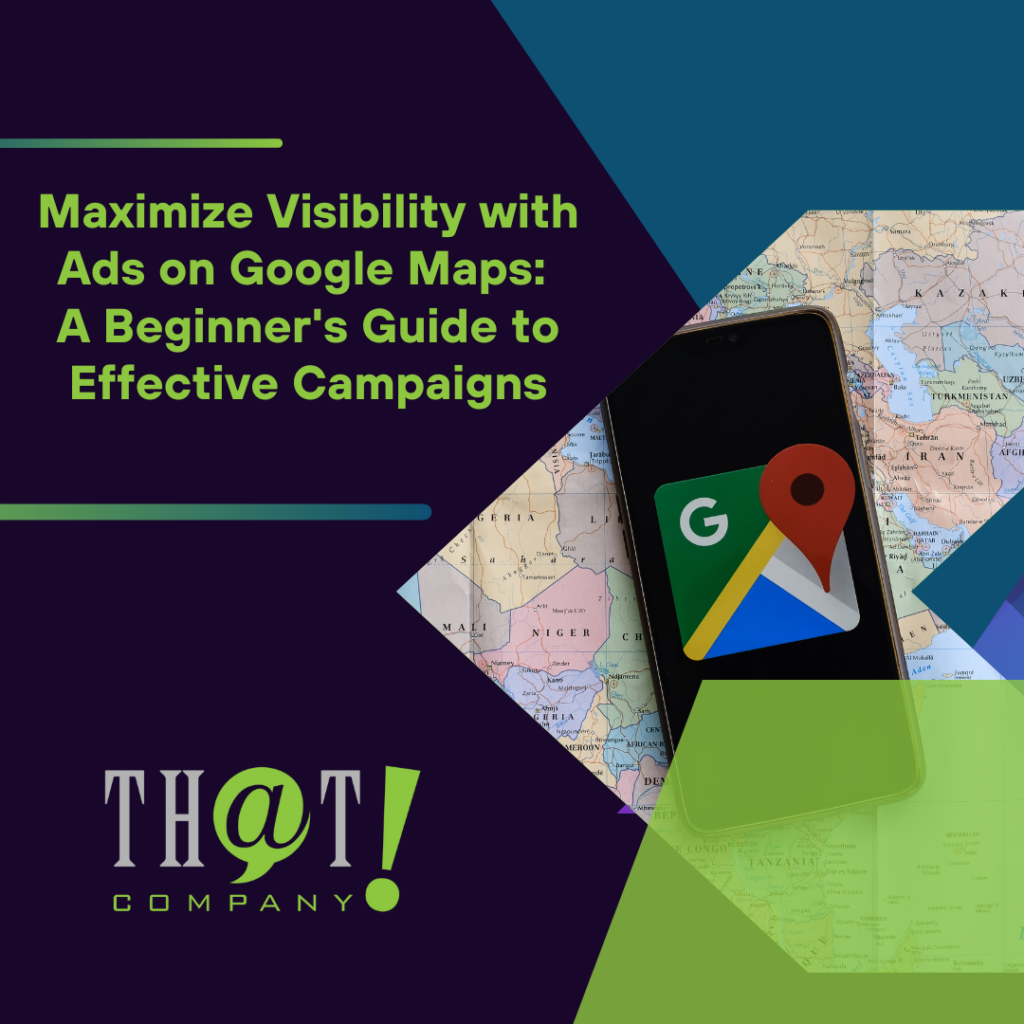
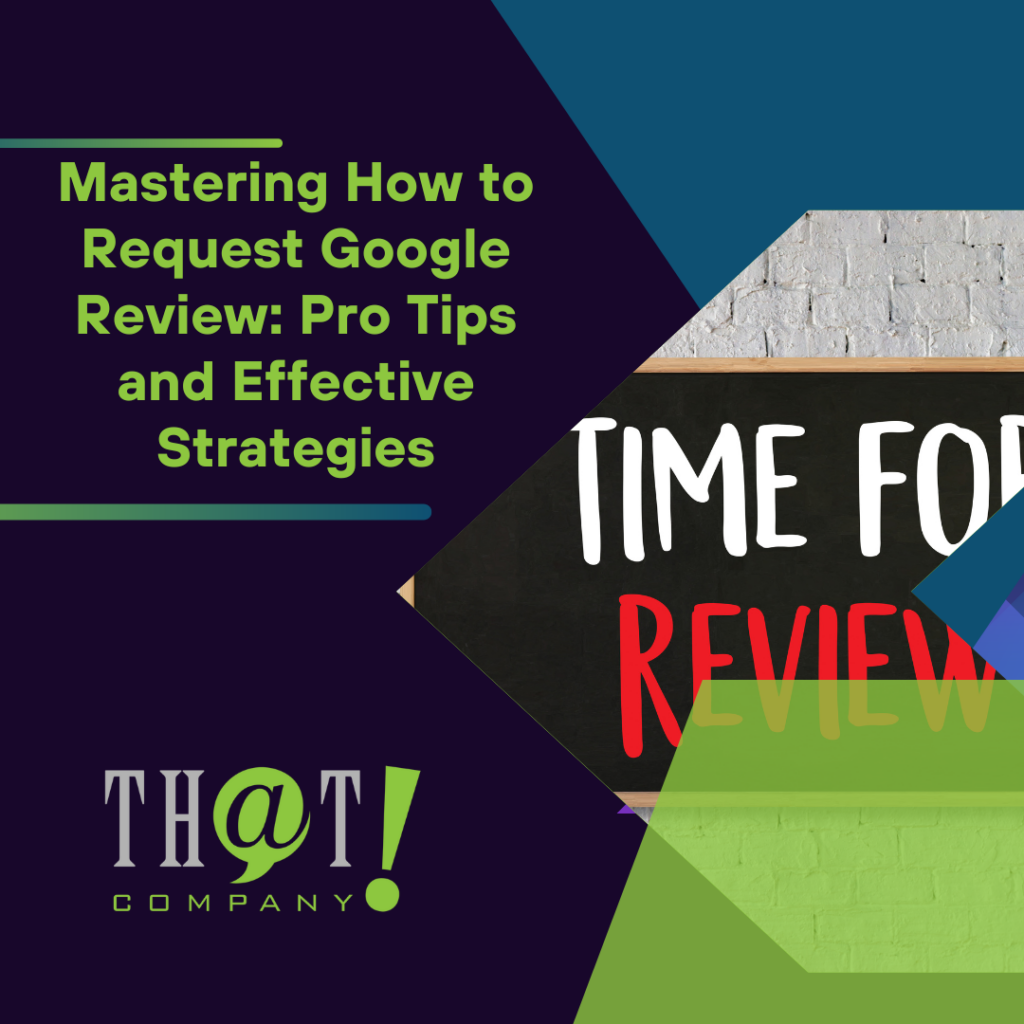

 Talk With Us
Talk With Us  Give Some Love
Give Some Love 


